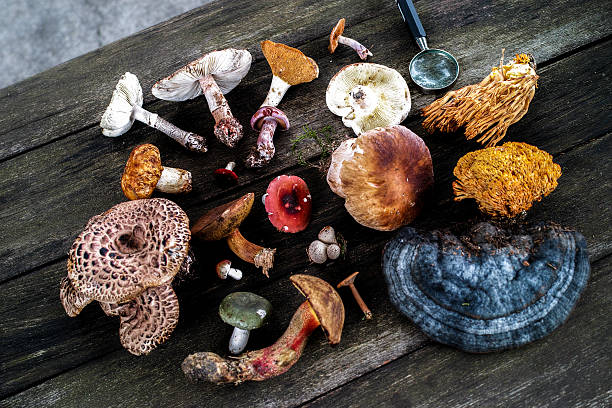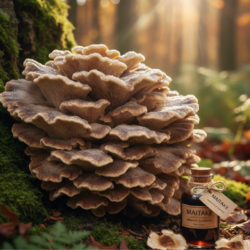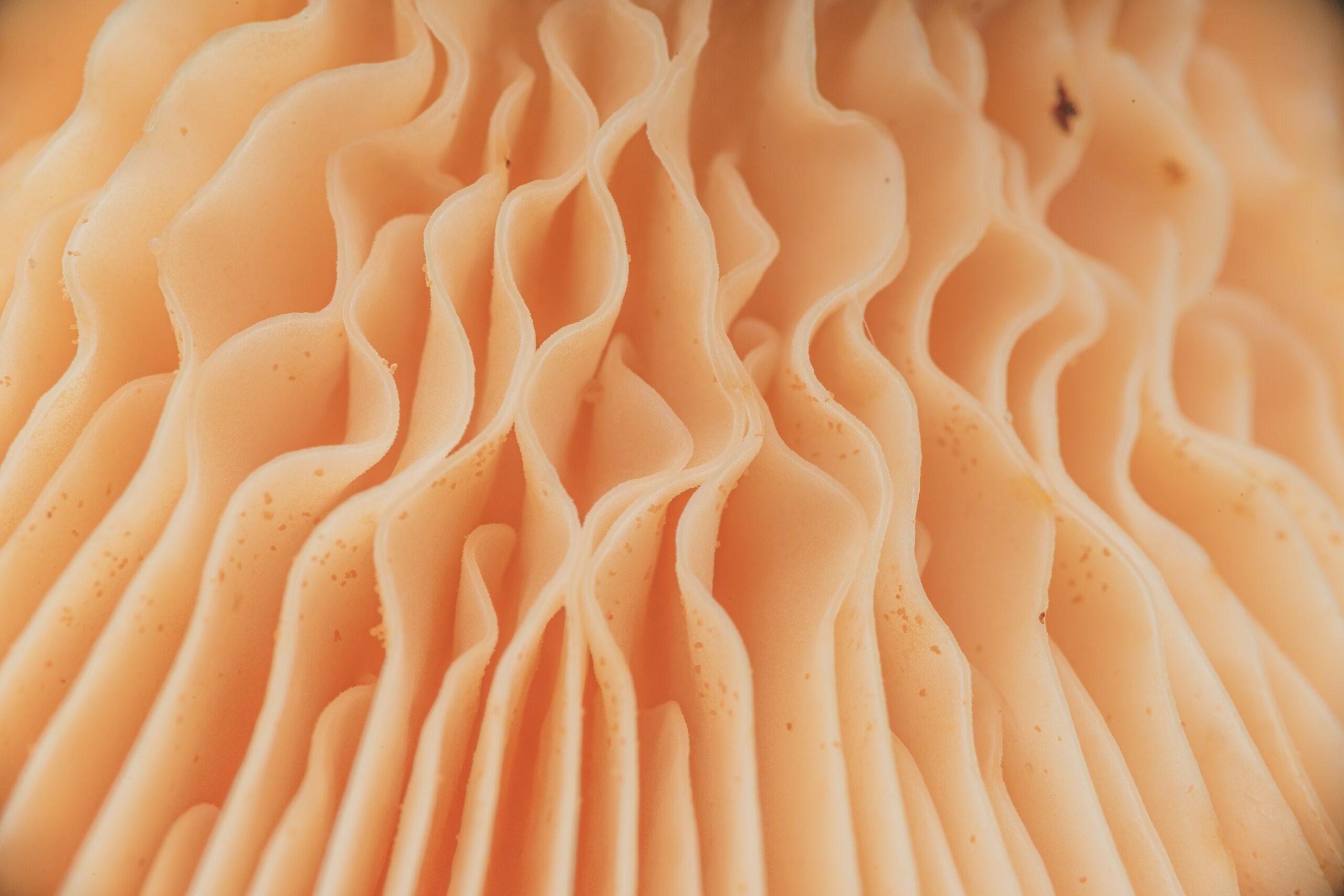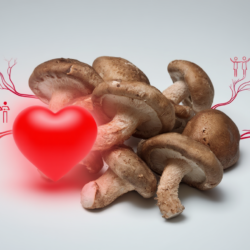Medicinal mushrooms are playing an increasingly important role in natural approaches to health, at the crossroads of tradition and modern scientific data. Used for thousands of years, they are now recognised for their effects on immunity, inflammation, metabolism and cell protection.
Rich in polysaccharides, beta-glucans, triterpenes, antioxidants, vitamins and minerals, these mushrooms stand out for the diversity of their bioactive compounds and their ability to provide in-depth support for the body. Each species has a particular signature, capable of modulating the body’s natural defences and promoting a better inner balance.
This article explains what medicinal mushrooms are, what mycotherapy consists of and how some of them can form part of an overall natural health approach.
What is Mycotherapy?
Mycotherapy is therapy using the fungal kingdom, i.e. mushrooms, as medicinal elements. The term was coined by researchers at Hifas da Terra in 2006. Since then, it has been used worldwide to refer to the therapy. The therapies use mushrooms (or fractions thereof) for health, prevention and integrative therapeutic support in various pathologies.
Medicinal mushrooms are fascinating producers of substances with positive effects for humans. A single species of medicinal mushroom can contain hundreds of bioactive substances.
Modern science has discovered various hypolipidemic, immunomodulatory and anti-tumour activities in medicinal mushrooms .
Other antioxidant, antiviral, antibacterial, antiparasitic, hepatoprotective and anti-diabetic properties have also been discovered.
Over the last 30 years, thousands of scientific articles have been published and numerous trials have supported the clinical applications of its ingredients:
- Lentinan and PSK are used in the treatment of cancer in Japan
- Erinacins help to rebuild neuronal tissue
- Lentionin is a powerful antiseptic used in toothpaste
- Triterpenes act as powerful anti-inflammatories with cortisone-like effects
Mycotherapy focuses on medicinal mushrooms. It aims to study them in order to develop nutritional products. Its aim is to maintain and improve human and animal health.
Why the name medicinal mushrooms?
Firstly, the fungi that make up the Fungi kingdom are fascinating organisms. They preserve their essential biochemical characteristics.
It is to them that we owe the interconnection of soil, nutrients and plants – a trinity fundamental to the development of life on Earth. The antibiotic discovery of one of them, Penicillum, gave rise to penicillin.
In his treatise on medicinal herbs, Pen Tsao, one of the fathers of Chinese medicine, the famous Shen Nong, refers to Reishi as a divine mushroom capable of prolonging life and harmonising physical and spiritual balance.
In the Bencao gangmu (Compendium of Chinese Medicine) by the physician Li Shi Zhen (1518-1593), Reishi is also mentioned: “consumed over a long period, bodily agility will not cease and years will be prolonged like those of immortal beings“.
Finally, mushrooms contain over 150 bioactive compounds in their structure. Eating them provides us with the best bioavailable alpha and β-glucans. They also provide us with enzymes, probiotics and natural antibiotics. B vitamins and ergosterol are also present. They also contain minerals such as selenium and zinc. In addition, they offer essential amino acids and other nutrients. These help to maintain the body’s homeostasis and/or balance.
What can mushrooms do for us?
Medicinal mushrooms are one of nature’ s greatest treasures . Long used in traditional Asian medicine, they are now attracting growing interest in Europe. They are renowned for their many health benefits . Thanks to their richness in polysaccharides, beta-glucans, triterpenes, vitamins and minerals, these unique organisms offer a broad spectrum of actions: supporting immunity. They also help to regulate stress, balance metabolism and protect cells. In mycotherapy, each mushroom has a specific profile. This profile acts in synergy with the body to strengthen its natural defences. It also helps to restore the body’s physiological harmony.
Shiitake (Lentinula edodes) :
To begin with, Shiitake has anti-tumour properties due to its immunostimulant activity, which protects against tumour development.
Lentinan stimulates the proliferation of T lymphocytes in the presence of interleukin-2. It stimulates macrophage activity and the production of interleukin-1. There is a clear reduction in the adverse effects of anti-tumour drugs.
It inhibits bacterial adhesion and biofilm formation, improving dental plaque. It is also a gastroprotective and antioxidant agent. It is generally used in adjuvant association with cancer chemotherapy.
Maitake (Grifola frondosa) :
Maitake is an adaptogen and immunostimulant, and probably has the strongest immune system stimulating activity of any mushroom.
Its polysaccharides cause apoptosis in breast cancer cells. Maitake extract amplifies the response of NK cells and increases the activity of macrophages and cytotoxic T lymphocytes. It inhibits immunosuppression resulting from the action of certain chemotherapeutic agents, and thus reduces the haematological toxicity of certain chemotherapeutic agents.
It has an interesting effect on immune system disorders. This mushroom is also lipid-lowering, anti-atheromatous and neuroprotective. Its activity in supporting and regenerating the neuronal transmission network is invaluable. The most interesting components of Maitake appear to be the polysaccharides, which act on the immune system.
Polypore versicolor (Coriolus versicolor-PSK) :
Polypore is an antioxidant with anti-cancer properties. It slows the spread of cancer cells. As a result, it is said to be anti-metastatic.
In short, mycotherapy offers an innovative and complementary approach to preserving health and promoting natural well-being. Medicinal mushrooms, true allies of the immune system and metabolism, act in depth to support the body in the face of everyday imbalances. Whether used alone or in combination with other therapies, they help to strengthen the body’s natural defences, promote vitality and restore inner balance. By choosing quality extracts from traceable, controlled sources, mycotherapy is fully in line with a global approach to prevention and respect for living organisms.





